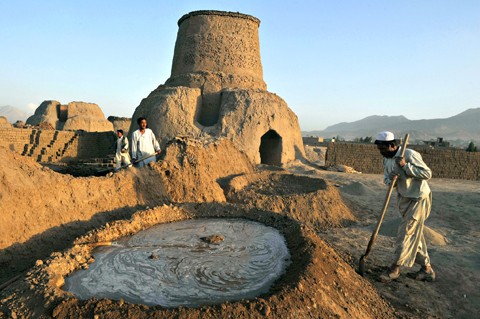Afghanistan put its Hajigak iron ore deposit back up for tender on Saturday, after taking it off the market last year, promising security for investors despite a worsening insurgency.
Afghan Mines Minister Wahidullah Shahrani said he hoped production would start by 2014 on what he said was a huge, high-quality ore vein, that offered investors a rare opportunity with reserves estimated to be worth as much as US$350 billion.
Security is likely to be the main concern to potential investors when Shahrani meets them at a conference in New York on Wednesday, with the insurgency at its most violent since the 2001 overthrow of the Taliban government.

PHOTO: AFP
The Hajigak deposit straddles Bamiyan, Parwan and Wardak Provinces, with only Bamiyan relatively peaceful.
Shahrani said that the Aynak copper mine south of the capital, developed by Chinese firms since 2008 and worth about US$43 billion, proved Afghanistan could protect important assets.
The government has a specially trained force to protect mines and other infrastructure, with many of its members drawn from villages surrounding the asset under guard.
“The community has been taking care of the Aynak deposit, even though that is in a very insecure part of the country ... in the last two years there has not been a single incident,” Shahrani told reporters visiting the mountainous region to the west of Kabul where the Hajigak deposit lies.
Villagers from nearby, mostly subsistence farmers, say they would try to protect any investment that brought jobs or infrastructure improvements, such as paved roads.
“Most of the young people have already left to find work, in Kabul or even Pakistan. I would very much like them to be able to stay here,” said Mohammed Sadiq, a 35 year-old farmer from Kotal Sufla village at the base of mountains that form Hajigak.
Shahrani expects the mine to create at least 7,000 direct, long-term jobs and many thousands more working in spin-off industries, such as services, construction and logistics.
“Mining companies know how to operate in insecure areas,” he said.
Expressions of interest are expected by mid-January, and Shahrani hopes to award the tender in next August, with at least two more years of detailed exploration to follow.
He did not say how much investment his government is seeking for the project, but forecast central government revenues of US$300 million to US$400 million per year once the mine reaches full production of an estimated 10 million tonnes a year.
A planned tender for last year was canceled, with the ministry citing the global recession and changes in the world market structure for iron as the key problems, although it came months after corruption allegations were levied against the mining sector in Afghanistan.

RESILIENCE: Deepening bilateral cooperation would extend the peace sustained over the 45 years since the Taiwan Relations Act, Greene said Taiwan-US relations are built on deep economic ties and shared values, American Institute in Taiwan (AIT) Director Raymond Greene said yesterday, adding that strengthening supply chain security in critical industries, enhancing societal resilience through cooperation and deepening partnerships are key to ensuring peace and stability for Taiwan in the years ahead. Greene made the remarks at the National Security Youth Forum, organized by National Taiwan University’s National Security and Strategy Studies Institution in Taipei. In his address in Mandarin Chinese, Greene said the Taiwan-US relationship is built on deep economic ties and shared interests, and grows stronger through the enduring friendship between

GAINING STEAM: The scheme initially failed to gather much attention, with only 188 cards issued in its first year, but gained popularity amid the COVID-19 pandemic Applications for the Employment Gold Card have increased in the past few years, with the card having been issued to a total of 13,191 people from 101 countries since its introduction in 2018, the National Development Council (NDC) said yesterday. Those who have received the card have included celebrities, such as former NBA star Dwight Howard and Australian-South Korean cheerleader Dahye Lee, the NDC said. The four-in-one Employment Gold Card combines a work permit, resident visa, Alien Resident Certificate (ARC) and re-entry permit. It was first introduced in February 2018 through the Act Governing Recruitment and Employment of Foreign Professionals (外國專業人才延攬及雇用法),

The Ministry of Transportation and Communications yesterday said that it would redesign the written portion of the driver’s license exam to make it more rigorous. “We hope that the exam can assess drivers’ understanding of traffic rules, particularly those who take the driver’s license test for the first time. In the past, drivers only needed to cram a book of test questions to pass the written exam,” Minister of Transportation and Communications Chen Shih-kai (陳世凱) told a news conference at the Taoyuan Motor Vehicle Office. “In the future, they would not be able to pass the test unless they study traffic regulations

‘COMING MENACINGLY’: The CDC advised wearing a mask when visiting hospitals or long-term care centers, on public transportation and in crowded indoor venues Hospital visits for COVID-19 last week increased by 113 percent to 41,402, the Centers for Disease Control (CDC) said yesterday, as it encouraged people to wear a mask in three public settings to prevent infection. CDC Epidemic Intelligence Center Deputy Director Lee Chia-lin (李佳琳) said weekly hospital visits for COVID-19 have been increasing for seven consecutive weeks, and 102 severe COVID-19 cases and 19 deaths were confirmed last week, both the highest weekly numbers this year. CDC physician Lee Tsung-han (李宗翰) said the youngest person hospitalized due to the disease this year was reported last week, a one-month-old baby, who does not